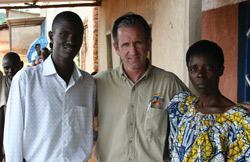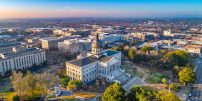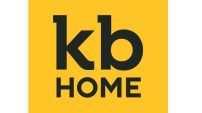Jeff Rutt
President, Keystone Custom Homes
Act Locally, Impact Globally

Image courtesy Jeff Rutt
Jeff Rutt visits with HOPE Rwanda staffer Charles Rwomushana (left) and a loan recipient.
When Jeff Rutt’s Ford Expedition was totaled in an accident, he settled on a Nissan Pathfinder as a replacement vehicle. The salesman tried to sell him a $6,000 upgrade package. Rutt, the president of Keystone Custom Homes in Lancaster, Pa., a company with revenues of $110 million in 2006, could certainly afford it. In the end, he opted for the standard features. He didn’t need the extras. And besides, $6,000 would fund $50 micro-loans (see “What Is Micro-Credit,” page 211) for 120 families in the Democratic Republic of the Congo.
“He just knows that for every $50 he saves, it’s another family that can get out of poverty,” says Peter Greer, president of HOPE International, the nonprofit micro-finance organization that Rutt founded in 1997. “It’s a bigger picture of Jeff practicing what he preaches.”
Rutt is indeed a man whose life reflects his beliefs and values. A deeply committed Christian, he has traveled extensively overseas on mission trips. It was one of those trips, to Ukraine, that planted the seed that would become HOPE International. His church had been sending shipping containers of food and medical supplies to a church in Zaporozhye. What the Ukrainian church wanted, though, was a way for its members to help themselves.
Rutt researched various business opportunities, settling on a sunflower seed processing operation. It sat in Ukraine for a year without being touched, from which Rutt says he learned an invaluable lesson: The local residents know their market better than an outsider.
Rutt started reading about micro-credit, a method of addressing poverty by providing very small loans to poor entrepreneurs who have no access to credit.
A Farmer’s Logic
It made all the sense in the world to Rutt, who had spent his first 10 years after high school putting in 100-hour weeks as a dairy farmer. Hungry to leave behind the bone-aching work and intent on making a better life for his family, he sold his herd in 1985 and went into real estate, selling houses and buying scattered lots to build on. He opened Keystone Custom Homes in 1992. He’s since been recognized three times by Builder as an America’s Best Builder honoree.
Rutt started traveling to Ukraine on mission trips about the same time. Five years later, with his home building business booming, he incorporated HOPE International as a nonprofit organization.
It was a gamble, to say the least. Micro-credit had never been done in Ukraine. The first year, HOPE issued 12 loans. “When I first started Keystone, we built 12 houses in the first year, too,” he says.
“I thought if we got the loans repaid at all, it would be good. But we’re not doing them any favors if they don’t repay the loan on time. There is no dignity if they don’t have repayment. As a builder, that resonates with us.”
Loan repayment is central to the concept of micro-credit. The borrower isn’t getting charity from someone who pities him; he’s getting a loan from an investor who believes in him. Paying it back gives the borrower the same sense of self-worth that a home buyer gets when he makes his final mortgage payment.
Today, Nadiya (“hope” in Ukrainian) Ukraine is the largest micro-credit organization in the country. Self-sustaining, its profits support Tomorrow Clubs, a children’s ministry that serves about 10,000 youngsters in after-school and summer camp programs.
But the work in Ukraine proved to be just the starting point for HOPE International. Rutt hired Eric Thurman, a leading expert in international philanthropy, as its first full-time employee in 1999. Greer, who had run micro-finance programs in several countries, came on board as HOPE’s president in 2004. By 2007, HOPE International had disbursed nearly 100,000 loans to more than 50,000 clients in 12 countries, with a portfolio of $6 million in outstanding loans.
Realized Dreams
The stories of changed lives are countless—and inspiring. Mama Atiya and her six children were destitute and homeless after the death of her husband. Tradition in the Democratic Republic of the Congo dictates that a man’s family can claim his estate when he dies, and her in-laws had taken everything she had. Her parents took them in, but she dreamed of owning her own home. On her meager salary as a smoked fish seller, it was never going to happen. A $55 loan from HOPE International allowed her to start her own business. After two years, she had saved enough money from her business to buy an apartment—and hopes to buy a second one for her older children.
Jose Luis Rincon began working with Esperanza (“hope” in Spanish) in the Dominican Republic city of San Pedro de Macoris in 1999. A construction worker who had sold his tools to buy food, his life was ruined, he says. Through loans from Esperanza, he received training as a welder and purchased tools and supplies to start a successful business making wheelbarrows. He’s recently expanded into selling wheelbarrow tires as well.
“Now I have a business, and I am building my own house,” he says. “I have a truck. Before, I didn’t even have a motorcycle. I have good prospects for the future.”
What One Man Can Do
The fact that Rutt has chosen to invest so much of his time and resources—HOPE International shares office space with Keystone Custom Homes—outside the U.S. was one of the reasons that Hearthstone Award recipient David Weekley decided to nominate Rutt for the award. Weekley also has placed an emphasis on making contributions overseas, primarily because there’s an extensive safety net for the poor in the U.S. that doesn’t exist abroad. Plus, small contributions in the U.S. can’t accomplish very much. But in a country where the average person lives on $1 a day, even a modest donation can literally change lives.
“Most people get involved in things in their own community, and that’s great,” Weekley says. “I decided I needed to get more leverage in my donations and looked outside the U.S. To find another person in our industry doing that was incredible to me. The more I delved into the idea, the more I saw parallel paths between micro-finance and entrepreneurship. Jeff provides an opportunity for all builders to see what one man can do. You can create great change in the world.”
Early on, it became obvious that HOPE needed a steady funding mechanism. Rutt attended a seminar about using houses as a way to fund charities. Houses for HOPE was organized before he got home. Born and raised in Amish country, where neighbors working together to help each other with construction is second nature, Rutt embraced—and championed—the concept of builders, their trade partners, and suppliers donating time and materials to build a spec house. Proceeds from the sale are donated to HOPE International. To date, 38 builders in several states have built 59 houses, raising $6.5 million.
Six of those houses have been built by Perry Bigelow, founder of Bigelow Homes in Aurora, Ill. An ardent fan of micro-credit, Bigelow is exuberant about the impact that the profit from those six houses—$1.2 million—is having in the world.
“One lousy little builder built six lousy little houses, and it generates resources for permanent economic sustainability for 200,000 people; 30,000 to 40,000 kids will go to school,” he says. “It’s the most incredible leveraged thing you can do. … The work I do as a builder pales by comparison.”
What Bigelow likes best about the concept is that “my trades and I are able to do what we do every day,” he says. “We leverage that in a way that doesn’t cost us very much, and we get such an incredible amount of good from it. … It makes it easy to do something really good.”
Electrical contractor Rich Martin feels the same way. Martin’s company, R.S. Martin of Leola, Pa., has donated complete electrical packages for all 18 Houses for HOPE homes built in the Lancaster area. Two more are underway. “It’s a way for us to contribute without major interruptions,” he says. “It’s another house on the schedule. We just [skip] the payment.”
The payoff, he says, is something much more valuable than a paycheck. It’s the ability to use his time and talents to live out his faith and help others. And by all the trade partners and suppliers pitching in, no one feels overly pinched.
“Through the efforts of HOPE, a little goes a long way,” Martin says. “It’s such a small thing on our part. As business people, it’s part of our moral obligation to help others. You can’t put a price tag on benevolence.”
But you can put a price on the ability to lift a family out of crushing poverty into a life with hope. It’s as little as $50. Just ask Jeff Rutt.


